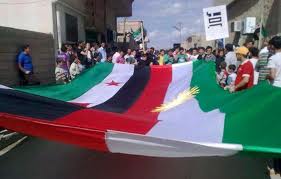 One of the first casualties in a war is the truth, and rumors can contribute to tensions and even escalate conflict. The different strategies of Kurdish political parties in Syria could result in more violence.
One of the first casualties in a war is the truth, and rumors can contribute to tensions and even escalate conflict. The different strategies of Kurdish political parties in Syria could result in more violence.
Recently, tensions between Kurdish groups allegedly associated with the Syrian Free Army (FSA) and the Kurdistan Workers’ Party (PKK) affiliated People’s Defence Committees (TEV-DEM) resulted in destruction of property, arrests and the deaths of between three and five people in Efrin on July 3.
According to a statement from TEV-DEM, members of the Kurdish National Council (KNC) complained to the Syrian Free Army that the Democratic Union Party (PYD) was suppressing anti-Assad demonstrations and kidnapping Kurdish activists.
In response, the FSA allegedly attacked PYD checkpoints and targeted the group in its speeches.
At the end of June, the PYD arrested Mustafa Juma of the Kurdish Freedom (Azadi) Party, releasing him after an apparent request from Kurdistan Region President Massoud Barzani. The PYD claimed Juma had been in touch with the Turkish intelligence service and the FSA with a view to plot against the PKK in Syria.
The PYD claims elements within the KNC are cooperating with Turkey to target them; anti-PYD groups claim the PYD is working with the PKK and Assad to suppress demonstrations. The PYD says this is Turkish propaganda, while other Kurdish parties claim that the PYD is not tolerant to non-PKK organizations.
With up to 4,500 fighters trained in the Qandil Mountains, the PYD in Syria cannot be easily challenged by the KNC. It’s possible the Azadi Party tried to work with the FSA in order to confront them.
While it is difficult to assess the truth of these claims, it is clear that the different policies and propaganda attacks could lead to more violence. Being a tribal people, Kurds often rely on revenge as a way to deal with opponents. On June 13, for example, a whole family was massacred in a village near Efrin. Some say the Assad regime was responsible, others that it was Kurds looking for revenge.
It was for this very reason that the KNC and PYD signed an agreement on June 11 to prevent further tensions. But despite the promises, violence has continued.
PYD leader Salih Muslim and People’s Council co-chairs Abdulsalam Ahmed and Sinem Mihemed met with Barzani and the Kurdish Council on July 5 in Erbil in order to ease the tensions. This is because the majority of the Syrian Kurds do not want conflict between Kurds.
But one little spark can cause a fire. Just look at what happened in Iraqi Kurdistan in the 1990s.
rudaw.net

Leave a Reply
You must be logged in to post a comment.